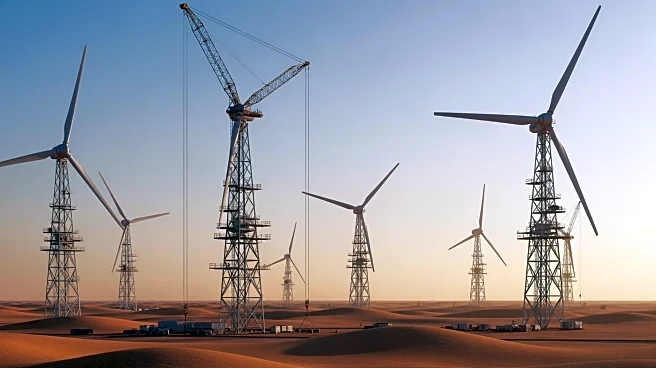What's Happening?
Saudi Arabia has inaugurated a wind tower manufacturing plant in Yanbu Industrial City, marking a significant step in its transition from oil dependency to renewable energy. The facility, operated by Al Yamamah Steel Industries, aims to produce 50,000
tonnes of steel towers annually for wind turbines. This initiative is part of Saudi Arabia's broader strategy to cut 278 million tons of emissions by 2030 and achieve net-zero emissions by 2060. The plant's opening was attended by the Kingdom's Minister of Energy, Abdulaziz bin Salman, who emphasized the country's shift towards diverse energy production, including green and clean hydrogen and electricity.
Why It's Important?
The launch of the wind tower manufacturing plant is a pivotal move for Saudi Arabia as it seeks to diversify its energy sources and reduce its carbon footprint. By investing in renewable energy infrastructure, the Kingdom is positioning itself as a leader in the global energy transition. This development could have significant implications for the global energy market, potentially reducing reliance on oil and gas and encouraging other nations to follow suit. The initiative also supports Saudi Arabia's Vision 2030, which aims to expand local supply chains and increase renewable energy usage to 50% by the end of the decade.
What's Next?
Saudi Arabia's commitment to renewable energy is expected to drive further investments and projects in the sector. The contracts signed for supplying wind towers to the Al Ghat and Waad Al-Shamal wind farms indicate ongoing expansion efforts. As the Kingdom continues to develop its renewable energy capabilities, it may attract international partnerships and investments, further solidifying its role in the global energy landscape. The success of these initiatives could also influence regional energy policies and encourage neighboring countries to adopt similar strategies.
Beyond the Headlines
Saudi Arabia's shift towards renewable energy reflects broader global trends and the increasing importance of sustainable practices. The Kingdom's efforts to reduce emissions and diversify its energy portfolio may also have cultural and economic impacts, potentially altering its international image and economic structure. As the country moves away from oil dependency, it may face challenges in workforce transition and economic adaptation, requiring strategic planning and investment in education and training.
















